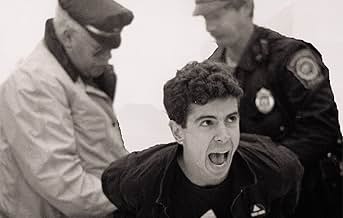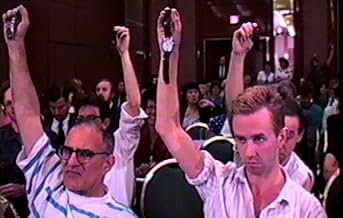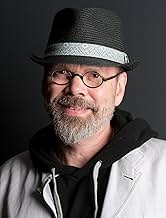IMDb-BEWERTUNG
7,6/10
4469
IHRE BEWERTUNG
Füge eine Handlung in deiner Sprache hinzuThe story of two coalitions -- ACT UP and TAG (Treatment Action Group) -- whose activism and innovation turned AIDS from a death sentence into a manageable condition.The story of two coalitions -- ACT UP and TAG (Treatment Action Group) -- whose activism and innovation turned AIDS from a death sentence into a manageable condition.The story of two coalitions -- ACT UP and TAG (Treatment Action Group) -- whose activism and innovation turned AIDS from a death sentence into a manageable condition.
- Für 1 Oscar nominiert
- 13 Gewinne & 21 Nominierungen insgesamt
Iris Long
- Self - Retired Chemist
- (Archivfilmmaterial)
- (as Iris Long PHD)
Bob Rafsky
- Self - PR Executive
- (Archivfilmmaterial)
Ed Koch
- Self - Mayor of New York
- (Archivfilmmaterial)
Barbara Starrett
- Self - AIDS Physician
- (as Dr. Barbara Starrett)
Franke-Ruta Garance
- Self - Teenager
- (as Garance Franke-Ruta)
Mathilde Krim
- Self - AMFAR, The Foundation for AIDS Research
- (as Mathilde Krim PHD)
Jesse Helms
- Self - R - North Carolina
- (Archivfilmmaterial)
Empfohlene Bewertungen
"How to Survive a Plague" takes real footage from the 1980s and 90s fight for health among the homosexual community and allows us to accurately re-live the tragedy of the rise of AIDS worldwide and the political incompetence to do anything about it. Part of the excellence of this documentary is allowing the actual events to speak for themselves. These activists had the foresight to record their conversations and protests, and these filmmakers had to foresight to know how to edit it to leave the power in the hands of those fighting.
AIDS Coalition to Unleash Power (ACT UP) was formed in New York in 1987. Establishing Larry Kramer as its spokesperson was one of the many smart moves this advocacy group made. He's well-spoken and he knows his facts. Approximately half-way through the film, Larry stands up and delivers a speech so Earth-shatteringly accurate, simple and poignant that the entire audience in the room and the entire audience for the film are left speechless.
There are times during this fight where the group dissipates and internal disagreements arise, and even though a separate group formed, this community stuck together and the emergence of TAG (Treatment Action Group) just doubled their efforts and accomplishments. AIDS patient and homosexual activist Peter Staley was one of the heroes of the film and is likely a personal hero to many. At the beginning, he was young, passionate and out-spoken but he knew his facts and could beat any politician in a debate. Just because he was gay, dying of AIDS and inexperienced doesn't mean he doesn't know what needs to get done and doesn't mean he doesn't know how to do it. Although these struggles took place 20 years ago, it's still inspiring.
They fought against the Catholic Church and judging by the look on the Bishop's face, they won. They fought against the FDA, and won. They fought against the NIH, and didn't really win. They fought against President George H.W. Bush, and the result was basically pounding their head against a brick wall, but at least they made out on his golf course lawn. They fought against President Bill Clinton, and at least they learned their lesson about debating a Rhodes Scholar. More importantly, they learned that it doesn't have to be a fight, and all advocacy, political and governmental groups worked in harmony. But by this time, it was indeed a plague and survival was the only option.
The film had some fascinating facts but unfortunately they were written with a flickering green font on a grey cityscape background and were barely legible. But listen to what they have to say, and ACT UP and TAG will teach you "How to Survive a Plague".
AIDS Coalition to Unleash Power (ACT UP) was formed in New York in 1987. Establishing Larry Kramer as its spokesperson was one of the many smart moves this advocacy group made. He's well-spoken and he knows his facts. Approximately half-way through the film, Larry stands up and delivers a speech so Earth-shatteringly accurate, simple and poignant that the entire audience in the room and the entire audience for the film are left speechless.
There are times during this fight where the group dissipates and internal disagreements arise, and even though a separate group formed, this community stuck together and the emergence of TAG (Treatment Action Group) just doubled their efforts and accomplishments. AIDS patient and homosexual activist Peter Staley was one of the heroes of the film and is likely a personal hero to many. At the beginning, he was young, passionate and out-spoken but he knew his facts and could beat any politician in a debate. Just because he was gay, dying of AIDS and inexperienced doesn't mean he doesn't know what needs to get done and doesn't mean he doesn't know how to do it. Although these struggles took place 20 years ago, it's still inspiring.
They fought against the Catholic Church and judging by the look on the Bishop's face, they won. They fought against the FDA, and won. They fought against the NIH, and didn't really win. They fought against President George H.W. Bush, and the result was basically pounding their head against a brick wall, but at least they made out on his golf course lawn. They fought against President Bill Clinton, and at least they learned their lesson about debating a Rhodes Scholar. More importantly, they learned that it doesn't have to be a fight, and all advocacy, political and governmental groups worked in harmony. But by this time, it was indeed a plague and survival was the only option.
The film had some fascinating facts but unfortunately they were written with a flickering green font on a grey cityscape background and were barely legible. But listen to what they have to say, and ACT UP and TAG will teach you "How to Survive a Plague".
"How to Survive a Plague" is a gripping documentary that tracks down the chronological history of HIV and AIDS, from its onset in the early 80's to today. During the 80's, it was actually a plague killing millions of people. The documentary focuses on two advocacy groups ACT and TAG, and their tireless work for decades to persuade U.S. governments to allocate more funds for AIDS research and medicine. Their efforts helped turn AIDS from a fatal disease to a manageable condition. This documentary might be hard to survive through; not because of any inadequacy but because of the frightful scenes showing how many young people with bright futures died from AIDS. Director David France proficiently exhibits the work of ACT and later TAG from its very beginnings, and then finalizes it showing several ACT & TAG members today in how they were able to survive AIDS. These brave & honorable men practically saved their own lives with their advocacy efforts, and that is one ACT that if hard to follow. OK, now TAG, you are it. Because it is your turn to get educated with France's love letter to ACT & TAG with a "How to Survive a Plague" viewing. **** Good
That seeming rarity: an incisive, heartfelt documentary about people doing good that is important, even today as AIDS is not the 'plague' it once was. It shows what people will do when they are pushed to a limit - it's not even about gay rights but about human rights, for proper health-care for the deathly ill. It's filmmaking that doesn't shy away from the rougher areas - when there is infighting in ACT UP, the director (first timer David France) shows it warts and all. But it's the heroism by the likes of Peter Staley and Mark Harrington that shines through the most. As Roger Ebert said, it's most emotional for the audience with a drama when seeing good people suffer, as do the people in ACT UP and in the AIDS crisis, and in doing good, against all odds.
We get the sense that they were not just fighting for themselves, though that was certainly a big component, but fighting for the millions that needed the medicine that could at least be attempted. The saddest part is seeing the trial and error over the years, where people who did take the early drugs like ATX just didn't get better like they should've. It's a bittersweet conclusion since by the time the medicine did get to the point where AIDS was at least something people could try and not, you know, kill them, so many had already passed (the ticker per-year that comes up becomes more and more shocking, albeit a lot of these numbers were from Africa). As a document of the AIDS/HIV crisis and as a pure protest movie and 'Fight the Powers That Be!' saga, it's moving, harsh, and keeps its story moving with compelling people who faced up to the fact that their fight had to be about science even before it being a social issue.
Oh, and the sort of 'reveal' you don't even expect in the last ten or so minutes... it shoots this up to being essential viewing.
We get the sense that they were not just fighting for themselves, though that was certainly a big component, but fighting for the millions that needed the medicine that could at least be attempted. The saddest part is seeing the trial and error over the years, where people who did take the early drugs like ATX just didn't get better like they should've. It's a bittersweet conclusion since by the time the medicine did get to the point where AIDS was at least something people could try and not, you know, kill them, so many had already passed (the ticker per-year that comes up becomes more and more shocking, albeit a lot of these numbers were from Africa). As a document of the AIDS/HIV crisis and as a pure protest movie and 'Fight the Powers That Be!' saga, it's moving, harsh, and keeps its story moving with compelling people who faced up to the fact that their fight had to be about science even before it being a social issue.
Oh, and the sort of 'reveal' you don't even expect in the last ten or so minutes... it shoots this up to being essential viewing.
Seeing this title I was expecting something of an apocalyptic, end-of- the-world zombie type film. In fact, this documentary was far truer, exploring a disease which has cost many lives. One might say I have an interest in LGBT causes and maybe this is why I decided to see this documentary, but AIDS is not exclusive to any community.
This documentary starts in the early 80's in New York where young men and women are dying of AIDS. There is no treatment and they are even refused in the hospitals. Each with their individual pain couldn't do much so they organized and created "ACT UP" whose main focus was to be an activist group, which through civil disobedience would bring attention, awareness, and most importantly a cure to AIDS. The documentary retraces some of their fights and quarrels mostly through archives but also with some more recent interviews. It covers some of the darkest hours before the discovery of the lucky combination that would prolong the lives of many, but would come too late to save those of many more.
I think the topic is one of the most important there is. It feels so distant but I can actually remember hearing about a treatment to AIDS back then. It meant very little to me at the time. I can't say that I really loved the way the documentary was going about things but I liked the substance very much. It is very scary to think back and imagine those people taking whatever medication that was on trial simply because at that point it couldn't have done more harm.
While I think activism is double-edged blade and can sometimes backfire, it seems that this very activism has saved many lives and the alerted politicians who at first refused to talk about how many lives AIDS had taken. There are some very emotional personal stories here, and if my rating was based solely on the people in this documentary, I'd give them all a 10 for their courage and perseverance through this tremendous pain.
I liked: The topic. Historically important.
I disliked: The shaky archive footage, the constant shouting and confrontations. It had only one sequence to explain the actual biological/chemical aspects, which I felt were important and deserved more screen time.
74/100 A little over 20 years ago, there were presidents who would go on television and say that AIDS has behavioral causes that should be looked at. This documentary could definitely teach them a thing or two.
This documentary starts in the early 80's in New York where young men and women are dying of AIDS. There is no treatment and they are even refused in the hospitals. Each with their individual pain couldn't do much so they organized and created "ACT UP" whose main focus was to be an activist group, which through civil disobedience would bring attention, awareness, and most importantly a cure to AIDS. The documentary retraces some of their fights and quarrels mostly through archives but also with some more recent interviews. It covers some of the darkest hours before the discovery of the lucky combination that would prolong the lives of many, but would come too late to save those of many more.
I think the topic is one of the most important there is. It feels so distant but I can actually remember hearing about a treatment to AIDS back then. It meant very little to me at the time. I can't say that I really loved the way the documentary was going about things but I liked the substance very much. It is very scary to think back and imagine those people taking whatever medication that was on trial simply because at that point it couldn't have done more harm.
While I think activism is double-edged blade and can sometimes backfire, it seems that this very activism has saved many lives and the alerted politicians who at first refused to talk about how many lives AIDS had taken. There are some very emotional personal stories here, and if my rating was based solely on the people in this documentary, I'd give them all a 10 for their courage and perseverance through this tremendous pain.
I liked: The topic. Historically important.
I disliked: The shaky archive footage, the constant shouting and confrontations. It had only one sequence to explain the actual biological/chemical aspects, which I felt were important and deserved more screen time.
74/100 A little over 20 years ago, there were presidents who would go on television and say that AIDS has behavioral causes that should be looked at. This documentary could definitely teach them a thing or two.
I really don't understand how this doco only scores a 7.3. It's the most compelling piece of film I have seen in years, I was gripped from the beginning to the end. It is basically about the early fight for treatment research and recognition that HIV sufferers have a disease and were entitled to respect and humanity from the wider community as it was not a punishment from God for a so called "lifestyle choice".
It is structured by piecing together a lot of archive film that is edited so brilliantly that it like watching a scripted film that tells a great story, a film with real stars and characters. The subject matter is based on HIV but what I took away from the film is how people with such a motivation did "act up" and used democracy to achieve an objective. It is compulsive viewing for any interested in any type of campaigning.
My only criticism of the film is it did not fully explore the reason for the early antagonism toward people with the virus and why the medical establishment and governments at that time were slow to act. But in the end I seen a film about a story I did not know about, a story about successful democratic campaign that has saved millions of lives. I now think these early campaigners should have got Nobel recognition. The film is that powerful.
It is structured by piecing together a lot of archive film that is edited so brilliantly that it like watching a scripted film that tells a great story, a film with real stars and characters. The subject matter is based on HIV but what I took away from the film is how people with such a motivation did "act up" and used democracy to achieve an objective. It is compulsive viewing for any interested in any type of campaigning.
My only criticism of the film is it did not fully explore the reason for the early antagonism toward people with the virus and why the medical establishment and governments at that time were slow to act. But in the end I seen a film about a story I did not know about, a story about successful democratic campaign that has saved millions of lives. I now think these early campaigners should have got Nobel recognition. The film is that powerful.
Wusstest du schon
- Zitate
Larry Kramer: [addressing to an angry protester] Plague! We're in the middle of a fucking plague, and you behave like this? ACT UP has been taken over by a lunatic fringe!
- VerbindungenFeatured in The Oscars (2013)
- SoundtracksThat's Us/Wild Combination
Performed & Arranged by 'Superhuman Happiness'
Written by Arthur Russell (as Charles Arthur Russell Jr.) (ASCAP)
Courtesy of Domino Publishing Company Ltd.
Top-Auswahl
Melde dich zum Bewerten an und greife auf die Watchlist für personalisierte Empfehlungen zu.
- How long is How to Survive a Plague?Powered by Alexa
Details
- Erscheinungsdatum
- Herkunftsland
- Offizielle Standorte
- Sprache
- Auch bekannt als
- Làm thế nào để sống sót trong bệnh dịch
- Produktionsfirmen
- Weitere beteiligte Unternehmen bei IMDbPro anzeigen
Box Office
- Bruttoertrag in den USA und Kanada
- 132.055 $
- Eröffnungswochenende in den USA und in Kanada
- 28.250 $
- 23. Sept. 2012
- Weltweiter Bruttoertrag
- 132.055 $
Zu dieser Seite beitragen
Bearbeitung vorschlagen oder fehlenden Inhalt hinzufügen

Oberste Lücke
By what name was How to Survive a Plague (2012) officially released in India in English?
Antwort

















